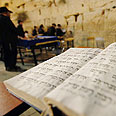
Illustration
Photo: Eli Elias
Two of Israel’s transgressions in the desert had fateful consequences, the sin of the Golden Calf and the sin of the Ten Spies. These two failings represent two inherent weaknesses of the Jewish People throughout the generations. One is the tendency to seek other gods (in the broad sense) in time of crisis. The second is an absence of true motivation to inherit the Land of Israel. These two weaknesses manifest themselves over and over in the history of the People of Israel.
In the Bible, the severity of these sins finds expression in their punishment:
1. The sin of the Golden Calf created the first rift in the intimate covenant between God and Israel – the Covenant of Sinai (“I bore you on eagles’ wings and brought you to Me” (Exodus 19:4)). This breach of intimacy is symbolized by the breaking of the first Tablets. After this sin, the relationship between God and His people weakened and became less intimate. A different, more distant arrangement became necessary in order to maintain the Sinaitic Covenant: “My angel shall go before you” (Exodus 32:34). So severe was the sin of the Golden Calf, that even the coming generations continued to bear its humiliation and sense its pain: “The Holy One said to them: You wept for naught, therefore I shall cause you to weep for generations” ( Ta’anit 29a).
2. The severity of the Sin of the Spies is greater than that of the Golden Calf. It expresses the nation’s unwillingness to confront the challenges that must be met in order to inherit the Land of Israel. On the one hand, this sin reflects the breach of faith that began with the Golden Calf, which caused God to doubt the people’s continued existence – “And the Lord said to Moses, How long will this people spurn Me, and how long will they have no faith in Me despite all the signs that I have performed in their midst? I will strike them with pestilence and disown them, and I will make of you a nation far more numerous than they!” (Numbers 14:11-12) – until Moses desperately pleads: “Pardon, I pray, the iniquity of this people according to Your great kindness, as You have forgiven this people ever since Egypt,” and God relents: “And the Lord said, I pardon, as you have asked” (14:19-20).
On the other hand, in expressing a lack of self-confidence, the Sin of the Spies also compounds upon the Golden Calf: “we looked like grasshoppers to ourselves, and so we must have looked to them” (Numbers 13:33). This sin delayed the entry into the Land of Israel by an entire generation.
As opposed to the Golden Calf, which was rooted in Israel’s Egyptian experience and the tendency to seek other gods in times of crisis, the Sin of the Spies is the product of two sins: A lack of faith in God’s promise to deliver the Land, and a lack of faith in the people’s own ability to confront the challenge of inheriting the Land, and thereby realize God’s promise to Abraham. Therefore, its severity exceeds that of the Golden Calf.
The leading biblical commentators devoted much thought to the narrative of the Spies, seeking to establish whose sin was greatest. Perhaps it was the spies who did not suffice with providing information to Moses and Aaron, but who went above their heads in leaking sensitive material to the people in order to incite rebellion against those who were leading them to the Promised Land. Or perhaps the sin of the people was greater because they were receptive to the interpretation of the facts leaked by the spies, and concluded “We cannot attack that people, for it is stronger than we” (Numbers 13:31), rather than rely upon the Divine promise.
Yet we are left wondering: How could a people enslaved in Egypt for hundreds of years – “Ruthlessly they made life bitter for them with harsh labor at mortar and bricks and with all sorts of tasks in the field” (Exodus 1:14) – living with the ancient hope of return to its ancestral home (“And they shall return here in the fourth generation” (Genesis 15:16)) retreat at the moment of truth?
Among the various commentaries, we find three relevant comments of particular interest:
- Rabbi Meir Simcha HaCohen of Dvinsk (1843-1926), wrote in his Meshech Hochma (Jerusalem (1926) p. 82): “It is possible that they said…such great wars are unsuited to our generation but are for our children who will be raised without degradation and slavery. Therefore they said ‘for it is stronger than we’ but not than our children.” In other words, the spies sought to prevent entry into the Land of Israel because, as leaders, they recognized the people’s spiritual weakness, and realized that such weakness would make victory impossible.
- Rabbi Isaiah Horowitz (1632-1689), author of the Shelah (Shnei Luhot HaBrit (Jerusalem (1993) p. 455), wrote that the spies feared the social changes that would be precipitated by the entry into the Land, which would bring about a change in the existing leadership.
- Professor Nechama Leibowitz (1905-1997) wrote in Studies in Bamidbar (Numbers) that because the people and their leaders were accustomed to slavery, they feared freedom and the responsibility that freedom brings, and they therefore undermined the entry into the Land.
Professor Shmuel Glick is a lecturer in education and Halacha at the Schechter Institute















